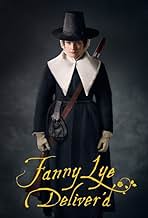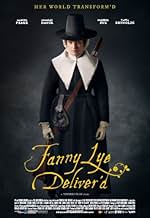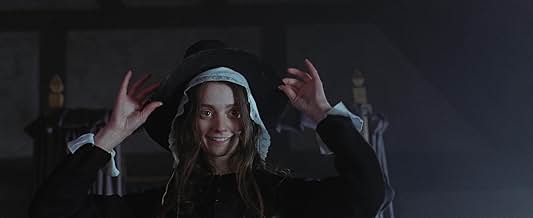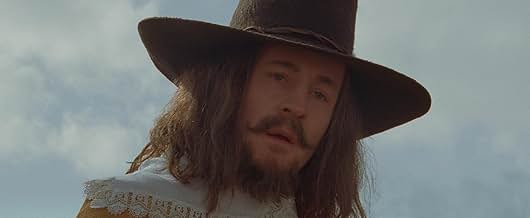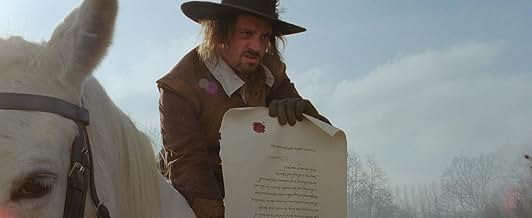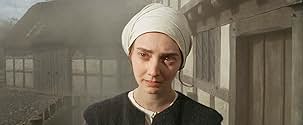Fanny Lye Deliver'd
- 2019
- 1 घं 52 मि
IMDb रेटिंग
6.2/10
2 हज़ार
आपकी रेटिंग
अपनी भाषा में प्लॉट जोड़ेंFanny lives in an English farmhouse in 1657 when militant Puritans rule. Two fugitives with radical new ideas arrive. When the sheriff arrives, things deteriorate badly prompting Fanny to ma... सभी पढ़ेंFanny lives in an English farmhouse in 1657 when militant Puritans rule. Two fugitives with radical new ideas arrive. When the sheriff arrives, things deteriorate badly prompting Fanny to make drastic decisions about her life.Fanny lives in an English farmhouse in 1657 when militant Puritans rule. Two fugitives with radical new ideas arrive. When the sheriff arrives, things deteriorate badly prompting Fanny to make drastic decisions about her life.
- पुरस्कार
- 1 जीत और कुल 7 नामांकन
फ़ीचर्ड समीक्षाएं
Horrible Histories meets Hammer Horror meets Blackadder....
The basic story could have been quite good but the film is so unrealistic as to be more of a pantomime than a drama. Low budget has not allowed for getting anything dirty so all the clothes, house etc are like brand new, nothing grubby as it would obviously have been and everyone looks like they are fresh out of the shower.
The acting is surprisingly ham and the baddies are more like a comedy duo despite being evil.
All in all, a missed opportunity as could have been good with the right budget and the chance to create a realistic dark representation.
The acting is surprisingly ham and the baddies are more like a comedy duo despite being evil.
All in all, a missed opportunity as could have been good with the right budget and the chance to create a realistic dark representation.
I was ready to turn this movie off. It's a period piece. Cromwell's in charge, the King was executed and a brutal war recently ended. I was bored. I would have rated it a 5, but the solid acting brought it up to 6.
About two thirds of the way through, there is a plot twist or two which were quite unexpected and gave the movie a bonus star. Try to stay until the credits run, as there is an epilogue which makes me now question if the movie was based on a real person.
About two thirds of the way through, there is a plot twist or two which were quite unexpected and gave the movie a bonus star. Try to stay until the credits run, as there is an epilogue which makes me now question if the movie was based on a real person.
The light that falls on John Lye's farm is diffuse, a gentle glow that passes through mist, It enters widows, softly illuminating Fanny Lye as she attends to household tasks. The imagery presented by director Thomas Clay and cinematographer Giorgos Arvanitis recalls paintings of Millet and Vermeer. While Millet's laborers sow the fields in ways suggesting contentment, and Vermeer's women appear touched by grace, the toils of Fanny (Maxine Peake) are attended by neither sentimentality nor joy.
Any sense of contentment is dispelled by an expository voice over and revelatory closeups. Fanny kneels on a hardwood floor as John lashes a switch across her back, her hands rigorously twist cloth in a wash basin. And the lovely woods and hills that surround her do not indicate an insular existence as much as an isolated one. There are no sign lines of the world beyond the stands of the trees and crests.
When youthful strangers, Thomas (Freddie Fox) and Rebecca (Tanya Reynolds) arrive, they assimilate into the family, bringing touches of levity to the Lye's young son Arthur and glimpses of liberation to Fanny. Both are interrupted by corporal punishment whenever John's notions of decorum are disturbed.
Rebecca lightens some of Fanny's burdens and Thomas emits whips of sensuality, these supported by the slow glide of Arvanitis's camera through the kitchen window to the exterior. As the fields of vision expand so, too, does the prospect of Fanny's freedom. Arvanitis also enables the audience to watch the characters like a stealthy observer, employing takes that gently pass around trees and structures to unimpeded views of the men felling trees and the women completing chores. The graceful movement of the still cam incrementally exposes challenges to John's constrictive Puritan values.
Ideologies eventually clash.
The competing perspectives, each supported by scriptural passages, struggle for dominance, the power shifting like the fortunes of the forces still fighting to control post civil war England. The battle illustrates a harsh truth: once any dogma takes control, ugly aspects of self righteousness and revenge are manifested.
In witnessing the struggle, Fanny is mostly silent as Peake's expressive face registers inner conflict, tightening at the possibility of pain for John or Arthur and relaxing at the prospect of freedom. As John, Charles Dance subtlety indicates his emotions in ways indicative of his mastery of screen acting-a slight tuck of the chin conveys disapproval, a quick blink, fear. Fox is best when his Thomas cajoles and charms, less so when he is charged with emotion. Reynolds adeptly projects both rustic ingenuousness and joyful licentiousness.
Beauty is present throughout the film. The first image of Rebecca is a closeup of her eyes, large and soft as those in a da Vinci portrait. And the pastoral beauty of the surroundings is consistently present. When violence intrudes, it plays out both suddenly and through gruesome struggle, unnerving audiences largely inured to depictions of injury and death. If Fanny's liberation is to come, barriers can be breached only by destruction and agony.
Any sense of contentment is dispelled by an expository voice over and revelatory closeups. Fanny kneels on a hardwood floor as John lashes a switch across her back, her hands rigorously twist cloth in a wash basin. And the lovely woods and hills that surround her do not indicate an insular existence as much as an isolated one. There are no sign lines of the world beyond the stands of the trees and crests.
When youthful strangers, Thomas (Freddie Fox) and Rebecca (Tanya Reynolds) arrive, they assimilate into the family, bringing touches of levity to the Lye's young son Arthur and glimpses of liberation to Fanny. Both are interrupted by corporal punishment whenever John's notions of decorum are disturbed.
Rebecca lightens some of Fanny's burdens and Thomas emits whips of sensuality, these supported by the slow glide of Arvanitis's camera through the kitchen window to the exterior. As the fields of vision expand so, too, does the prospect of Fanny's freedom. Arvanitis also enables the audience to watch the characters like a stealthy observer, employing takes that gently pass around trees and structures to unimpeded views of the men felling trees and the women completing chores. The graceful movement of the still cam incrementally exposes challenges to John's constrictive Puritan values.
Ideologies eventually clash.
The competing perspectives, each supported by scriptural passages, struggle for dominance, the power shifting like the fortunes of the forces still fighting to control post civil war England. The battle illustrates a harsh truth: once any dogma takes control, ugly aspects of self righteousness and revenge are manifested.
In witnessing the struggle, Fanny is mostly silent as Peake's expressive face registers inner conflict, tightening at the possibility of pain for John or Arthur and relaxing at the prospect of freedom. As John, Charles Dance subtlety indicates his emotions in ways indicative of his mastery of screen acting-a slight tuck of the chin conveys disapproval, a quick blink, fear. Fox is best when his Thomas cajoles and charms, less so when he is charged with emotion. Reynolds adeptly projects both rustic ingenuousness and joyful licentiousness.
Beauty is present throughout the film. The first image of Rebecca is a closeup of her eyes, large and soft as those in a da Vinci portrait. And the pastoral beauty of the surroundings is consistently present. When violence intrudes, it plays out both suddenly and through gruesome struggle, unnerving audiences largely inured to depictions of injury and death. If Fanny's liberation is to come, barriers can be breached only by destruction and agony.
If you live in a family that is quite strict, strangers coming from outside may feel like a welcome (pun intended) distraction. On the other hand, the father (wonderfully played here) may have the best interest in mind and heart, but his harsh and way too restricted views are not helping his wife or "kid".
The outlaws from outside really bring imbalance. Depending on your moral views, your sympathy may sway from one scene to the other. It is ok to feel, you are being given a tough choice. Morally speaking this isn't too easy - but that is what the movie gives you. Something to think about - something to chew on. And questions about what is good and what is bad, that go beyond religion and obvious answers.
Not sure why my previous comment got deleted, but while I had not saved it yet, I will park this somewhere just in case, someone feels the need to be mean - which would bring us to the characters: who is eventually the mean one? Who do you side with? Have you decided yet?
The outlaws from outside really bring imbalance. Depending on your moral views, your sympathy may sway from one scene to the other. It is ok to feel, you are being given a tough choice. Morally speaking this isn't too easy - but that is what the movie gives you. Something to think about - something to chew on. And questions about what is good and what is bad, that go beyond religion and obvious answers.
Not sure why my previous comment got deleted, but while I had not saved it yet, I will park this somewhere just in case, someone feels the need to be mean - which would bring us to the characters: who is eventually the mean one? Who do you side with? Have you decided yet?
A magnificent tale of a downtrodden wife and mother who is beat down by her bully, self-important husband who regularly beats both her and their little son for no reason other than he hates. He hates her, women, children who love their mother, the world, and himself. He is truly a child of his time; that time is 1657, during the cycle of English Civil Wars. One day as they arrive home to their farm from church (her husband riding the horse while she and the child walk) they find they have been invaded. A young couple has run to their secluded farm to hide out. What will the uber judgmental man of the farm do with them? This movie is not only authentic and beautifully made but it had my jaw dropping a couple of times. The cast is superb, especially that Peter McDonald as the High Sheriff for the Council of State. There isn't a sour note in the whole work.
क्या आपको पता है
- ट्रिवियाThe local accent in Shropshire and eastern Powys of the time was not recognisably "Welsh" or "West Midlands" in the way that might be expected today.
- गूफ़Among the linguistic anachronisms in the script are the following: Pee - to urinate: Although an old expression, the Oxford English Dictionary states that the term didn't come about until the eighteenth century, the century after this film is set. Shrooms - mushrooms with psychedelic properties: The first recorded use of this term in print was in Australia in 1977 Mixed emotions - a mid-twentieth century term describing ambivalence. Bleed out - to die due to blood loss: A twentieth century term with its origins in the United States (it is suggested that it was originally military jargon). Lose the attitude - An instruction meaning don't be rude: A late twentieth century term with its origins in the US.
- इसके अलावा अन्य वर्जनAlso exists in an Extended Cut, around 19 minutes longer than the Theatrical Cut, and currently only available through the film's 4K Ultra HD disc release in the UK. This version is the director's preferred version of the film.
- साउंडट्रैकMarch to Joy
Written by Thomas Clay
Based on "Symphony No. 9" written by Ludwig van Beethoven
Heard as end theme
टॉप पसंद
रेटिंग देने के लिए साइन-इन करें और वैयक्तिकृत सुझावों के लिए वॉचलिस्ट करें
- How long is The Delivered?Alexa द्वारा संचालित
विवरण
- रिलीज़ की तारीख़
- कंट्री ऑफ़ ओरिजिन
- आधिकारिक साइटें
- भाषा
- इस रूप में भी जाना जाता है
- The Delivered
- फ़िल्माने की जगहें
- उत्पादन कंपनियां
- IMDbPro पर और कंपनी क्रेडिट देखें
बॉक्स ऑफ़िस
- दुनिया भर में सकल
- $40,753
- चलने की अवधि1 घंटा 52 मिनट
- रंग
- पक्ष अनुपात
- 2.39 : 1
इस पेज में योगदान दें
किसी बदलाव का सुझाव दें या अनुपलब्ध कॉन्टेंट जोड़ें






